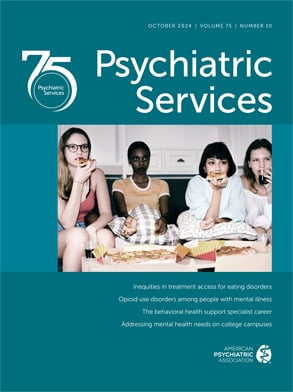Issue Focus: Multisite Services Effectiveness Trials
A large proportion of this issue of Psychiatric Services is devoted to reports on various multisite services effectiveness trials. Stephen Leff, Ph.D., and his coauthors studied the effects of job development and job support on the acquisition and retention of competitive employment by persons with mental illness. Their results are reported on page 1237. In another article, Dr. Leff and his colleagues describe a five-site study that compared Medicaid managed behavioral health programs and fee-for-service programs for adults with serious mental illness in terms of service use and quality, satisfaction, and symptoms and functioning (page 1245). Three additional articles stem from the Women, Co-occurring Disorders, and Violence Study (WCDVS), the first major federal effort to address the lack of appropriate services for women with co-occurring mental health and substance use disorders who have a history of physical or sexual abuse. In the first of these articles, Joseph P. Morrissey, Ph.D., and his colleagues present the results of this nine-site quasi-experimental study at the final 12-month follow-up and answer the question of whether positive effects at six months were maintained at 12 months (see page 1213). Marisa Elena Domino, Ph.D., and her coauthors then discuss the 12-month costs associated with the services received by the women in the study (page 1223). Finally, Chanson D. Noether, M.A., and associates describe the overall design of the WCDVS and provide suggestions for future research (page 1233). And in Taking Issue, APA President Steven S. Sharfstein, M.D., laments the erosion of federal support for multisite services effectiveness trials, noting that the studies reported in this issue of the journal emphasize the impact of and the need for continued investment in the acquisition of knowledge by the field of psychiatry (page 1185).
Special Section on Relapse Prevention
This issue also features a special section on relapse prevention among patients with co-occurring substance abuse and other mental disorders, guest edited by Robert E. Drake, M.D., Ph.D. The articles in this section result from a July 2003 conference hosted by Dartmouth Medical School and designed to address what Drake refers to as an "embarrassing insight": the fact that clinical and services researchers have "overemphasized the early stages of substance abuse treatment and neglected the long-term course of the disorder." Mark P. McGovern, Ph.D., and colleagues summarize theory and research on relapse prevention among persons with substance use disorders (see page 1270). Articles by Haiyi Xie, Ph.D., and colleagues (page 1282) and Angela L. Rollins, Ph.D., and colleagues (page 1274) provide quantitative perspectives on predicting relapse among clients who appear to be in stable remission. Kristin E. Davis, Ph.D., and Sheila J. O'Neill, L.C.S.W. (page 1288), as well as Maxine Harris, Ph.D., and her colleagues (page 1292), present more qualitative perspectives. Finally, Dr. Drake and coauthors summarize the findings and draw inferences for future study (page 1297).
Improving the Quality of Depression Treatment for Medicaid Recipients
Depression is frequently undiagnosed, untreated, or inappropriately treated when recognized in primary care settings. Although intervention studies have shown that collaborative care can improve the detection and treatment of depression in a cost-effective manner, existing financial and organizational structures often prevent evidence-based practices from being incorporated into routine care. Attention has increasingly focused on the organizational and payment context within which depression is treated. In this month's Economic Grand Rounds column, Colleen L. Barry, Ph.D., and Marshall R. Thomas, M.D., identify ways in which the quality of depression care among Medicaid recipients could be improved and describe system-level changes made by a nonprofit Medicaid health plan toward this end. The plan's experience suggests that Medicaid-focused arrangements create opportunities for better aligning incentives among patients, health plans, and providers that often do not exist in the private sector (see page 1193).
Briefly Noted …
The Law & Psychiatry column highlights potential difficulties faced by persons with mental illness who seek protection under the Americans With Disabilities Act (page 1188).
In Personal Accounts, Charles G. Curie, M.A., A.C.S.W., Administrator of the Substance Abuse and Mental Health Services Administration, recounts a harrowing experience he had with the health care system—one that enhanced his insight into seclusion and restraint (page 1203).

